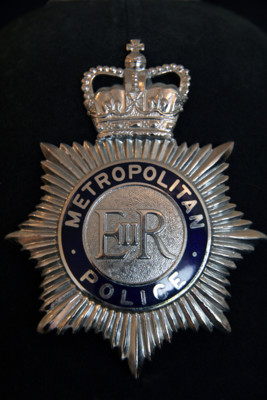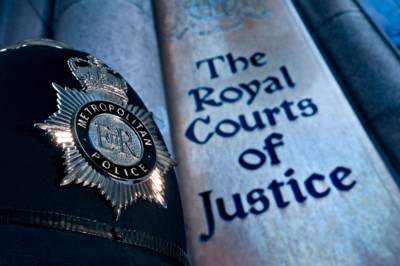Police Operations (1)

CITIZENS ARREST.
UK law around a member of the
general public,detaining or
apprehending a person (suspect)
is not as clear as a person may
think.
effecting a 'citizen arrest'
as it is known,but the very act
of detaining a person,is in itself
dangerous and may amount to
being unlawful.
The Police and Criminal Evidence
Act 1984 s24A amended by the
Serious Organised Crime and
Police Act 2005,
do allow statutory powers to
a member of the general public
to detain an individual.
provided that the person they
are or have detained,has in
their opinion,considered to be
involved in criminal activities.
UK law states,
"anyone can apply the 'citizen arrest; on an individual when,
an indictable offence is being
committed.
there are reasonable suspicion
that an indictable offence is being
committed.
an indictable offence has already
been committed..
an individual is causing injury to
themselves or others.
suffering physical injury
causing damage or loss or
property or
escaping from the police before
they can be taken into custody".
the individual can only be arrested by a citizen,if it is not practical for
the police to carry out the arrest.
the individual arrested must be
informed that 'you'; are making a
citizen arrest as soon as possible
the individual arrested
must be told why they are
being arrested
the offender must be
informed of the offence,
that 'you' think
that they have
committed.
reasonable force can
be used during the
arrest.
after the individual has
been arrested,they
should be taken to a
police station or
magistrate
if they are not,the arrest
is not valid.
a statement will be
required by the police from
the person who made the
arrest as the case may
proceed to
court.
POWERS and PROCEDURES.
(Victims and Witness)

Police Caution.
"you are under arrest on
suspicion of (offence)
you do not have to say anything,
but it may harm your defence if
you do not mention when
questioned something which
you later rely on in court"

Victims and Witness.
"Witnesses play a vital role in helping the police to solve crimes
and deliver justice.
The criminal justice system
cannot work without them.
The position of witnesses are in
the system is vitally important,
the truth is they are sometimes
taken for granted".
Who are Witnesses?
The term 'witness' is
defined in UK law as
someone,other than
the defendant,who might
be called to give evidence
in a criminal or anti-social
behaviour court
proceedings.
Youth Justice and Criminal
Evidence Act 1999 s63
(YJCEA) and the Domestic
Violence,Crime and Victims
Act 2004 s52
What then does the definition of
a witness include,and what it
does not include.
The definition is not limited to the
testimony of someone,who was
at crime scene at the time of the
offence.
It would include people who are
able to provide evidence of an
incriminating statement.
It is important to bear in mind
that the definition of 'witness' is
a person that may be called upon
to provide evidence in a court of
law
also bear in mind,UK law on
wasting police time,
providing a false statement,
and perjury.
so effectively a 'witness' is a
person other than members of
the family,that can provide
background material.
WITNESS CLASSIFICATION
Classification of witnesses are an
important element of a criminal investigation,because it has
consequences for the investigation
in terms of how the interview is
recorded.
Witnesses fall into one or more
of the following categories.
vulnerable;
intimidated;
significant;
Criminal Justice Act 2003 s137;
other;
Criminal Justice Act 2003 s137
Evidence by Video Recording.
a) a person is called as
a witness in proceedings
for an offence triable only
on indictment,or for a
prescribed offence triable
either way.
b) the person claims to
have witnessed
(whether visually or in
any other way)
(i) events alleged by
the prosecution to
include conduct constituting
the offence or part of the
offence or
(ii) events closely
connected with such events.
VULNERABLE and INTIMIDATED
WITNESSES.
the court must take account of
the views of the witness in determining whether a witness
falls into the final category
Physical Disability.
the court must also determine
the quality of the witness evidence is it likely to be diminished in the
circumstances..
the court has to consider the likely completeness,coherence,
and accuracy of the evidence.
Vulnerable Witness.
all child witnesses (under 18)
and
any witness whose quality
of evidence is likely to be
diminished because they;
are suffering from a
mental disorder as defined
by the (Mental Health Act
1983)
have a significant impairment
of intelligence and social
functioning;or
have a physical disability or are
suffering from a physical disorder.

INTIMIDATED WITNESSES
the court defines an intimidated
witness as those whose quality
of testimony is likely to be
diminished by reason of fear
and distress.
the court will determine the
following to make determination.
the nature and alleged
circumstances of the
offence;
the age of the witness;
where relevant.
the social and cultural background
and ethnic origins of the witness;.
the domestic and employment
circumstances of the witness;
any behaviour toward the
witness by;
the accused
members of the accused
person's family or associates;
any other person who is likely
to be either an accused person
or a witness in the proceedings.
Complainants in cases of
sexual assault and witnesses
to knife and gun crime are
also defined into the
intimidated witness category,
SPECIAL MEASURES
In some courts and on request
(if available) and the
timetable of the court session
'special measures' can be made
available to assist vulnerable
and intimidated witnesses
the use of screens;
the use of TV link;
giving evidence in private;
the removal of wigs and gowns;
the use of video-recorded
interviews as evidence-in-chief
the use of video-recorded
cross-examination
communication through
intermediaries;
the use of special
communication aids
ELIGIBILITY for SPECIAL
MEASURES.
whether or not the court
deems the complainant
'eligible' depends on two
considerations,
whether the 'special measure'
in question has been
implemented;and,
whether the 'special measure'
in question is likely to
maximize the quality of their
evidence.

WITNESS ANONYMITY and
WITNESS PROTECTION.
In extreme cases of intimidation
where it is thought the best
way of protecting the witness,
or their family and friends from
harm is to conceal their identity.
from a suspected offender.
anonymity legislation does
exist ,allowing for an application
to be considered for
witness anonymity.
In the most serious cases,
where a suspected offender
is already aware of a witness's
identity or is likely to deduce
their,identity because of the
nature of their evidence.
and the witness or their family
is at serious risk of harm,
witness protection could be
considered,
SIGNIFICANT WITNESSES.
are defined as people who,
have or claim to have witnessed,
visually or otherwise,an
indictable offence,part of such
offence,or events closely
connected with it.
stand in a particular relationship
to the victim or have a central
position in an investigation into
an indictable offence.
INTERVIEWING WITNESSES
(Consent)
Witness interviews should take
place with the 'informed consent'
of the 'interviewee'
informed consent in this context
refers to understanding the
purpose of the interview.
Informed consent is not only a
moral imperative,it is as a
procedural requirement.
Vulnerable and Intimidated
Witnesses;
Children;
Vulnerable Adult Witnesses
and Mental Capacity;
Adult Complainants to
Sexual Offences;
Significant Witnesses;
all require their own procedure
to start and/or progress an
interview.
Witnesses are important to
an investigation as well as
the actual victim of a crime
UK legislation is in place to
protect a witness and it is
in place to punish the offender.
